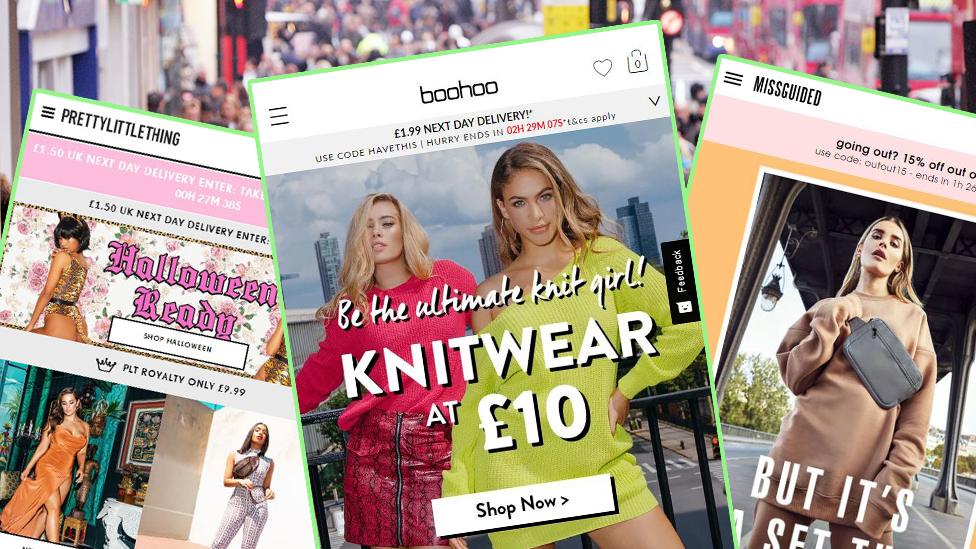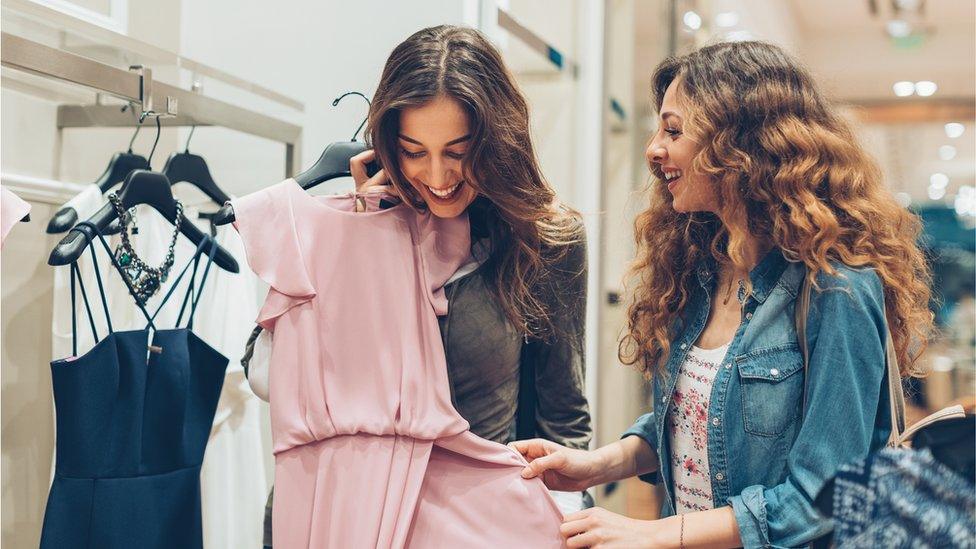Can you be sustainable if you're into fast fashion online?
- Published

Fast fashion online is a booming industry - how does it affect the environment?
Scrolling through Instagram, you're bound to come across an influencer wearing an outfit from one of the internet's many fast fashion retailers.
Sites like Boohoo.com, Pretty Little Thing and Missguided offer loads of clothes at really low prices - and they update much quicker than the high street.
But how are these online retailers impacting the environment? And what role does social media play in the "wear it once" trend?
MPs released a report last week outlining their worries about fast fashion's effect on the environment.
They found that British shoppers are buying twice as many items of clothing as they did 10 years ago and that discarded clothes are piling up in landfill sites.
The fashion industry is a major source of the greenhouse gases that are overheating the planet, said MPs, and they approached a number of high street retailers about the issue.
But one thing missing from the report is the impact of the many online fashion sites popular with young women in the UK.
Allow Instagram content?
This article contains content provided by Instagram. We ask for your permission before anything is loaded, as they may be using cookies and other technologies. You may want to read Meta’s Instagram cookie policy, external and privacy policy, external before accepting. To view this content choose ‘accept and continue’.

Patsy Perry, a fashion marketing lecturer at the University of Manchester, said the way these websites are designed encourage people to buy more.
"Some of them might have new products every week," she told Radio 1 Newsbeat. "They really trade on very very frequently renewing collections, more so than many traditional high street retailers."
'We've got a real crisis in confidence in young people'
As well as the availability of new clothes, the trend of posting outfits on social media makes some women feel like they can't wear the same thing more than once, says Patsy.
"We see celebrities doing that - all the big influencers you barely see them wearing the same thing twice," she adds.
Natasha Daniels agrees. She runs a site called Our Daily Thread, which she describes as a love letter to fashion.
The pressure to update your wardrobe all the time is real and needs to be addressed, says Natasha. But she worries that the retailers are being used as an easy scapegoat for an underlying cultural attitude.
"We've got to look at the reasons why people are turning to fast fashion," she says.
"I think we've got a real crisis in confidence in young people and when you pair that with the Instagram culture of: 'I don't want to wear the same outfit twice', people buy new clothes in response."
Allow Instagram content?
This article contains content provided by Instagram. We ask for your permission before anything is loaded, as they may be using cookies and other technologies. You may want to read Meta’s Instagram cookie policy, external and privacy policy, external before accepting. To view this content choose ‘accept and continue’.

But the motivation isn't the same for everyone. Shoppers on a budget aren't buying clothes to wear once, they're buying cheap clothes because they can't afford more expensive options, says Natasha.
"For a lot of people, it isn't throwaway and frivolous. For a lot of people, buying clothes from those sites is their clothing budget," she says.
"These are the clothes that they wear every day and I think tarring it with the fast fashion brush is a really snobby attitude to have."
'It doesn't come without a guilty conscience'
There's no doubt that online fast fashion is booming. PrettyLittleThing and Nastygal fashion labels reported a 50% rise in sales in the six months to August 2018.
Boohoo's social media followers have also soared. The brand now has 6.3 million followers on Instagram, a 200% rise in the last 12 months. It has 1.4 million followers on Facebook.
But there is growing awareness among young people that constant clothing consumption is impacting the environment, says Sara McAlpine, ELLE UK's fashion features editor.
Allow Instagram content?
This article contains content provided by Instagram. We ask for your permission before anything is loaded, as they may be using cookies and other technologies. You may want to read Meta’s Instagram cookie policy, external and privacy policy, external before accepting. To view this content choose ‘accept and continue’.

Her magazine recently surveyed its readers, external and found that 9 in 10 wanted to know more about sustainability.
"They are aware that they have an appetite for more but I don't think that comes without a guilty conscience or the awareness that we are accumulating all these things," she said.
How to be a sustainable fashion lover
Natasha says we should be encouraging people to buy things they really love, instead of shaming them for buying things at all.
"If you want to buy something from Boohoo and it's £10 - that's fine," she says. "Just make sure it's something you really want that you know you'll wear a lot."
And when you are finished with a piece of clothing, don't throw it in the bin. "Give it to a charity shop or put it in a clothes bank," says Hannah Carter from Love Not Landfill, a campaign to encourage clothing sustainability.
"Anything that goes into a clothes bank will be recycled, even odd socks, old knickers and stained tops. Nothing will be wasted."
Hannah also suggests trying to make clothes last a bit longer by looking after them better, by mending a minor tear or sewing a button back on yourself. She even has a tip for the wash cycle: "Wash on low temperatures and try to avoid tumble drying and dry cleaning as it's tough on the fabrics. Clothes will last longer if they're hung out to dry."
Changing your shopping habits is difficult, says Patsy, from the University of Manchester: "It's like fast food, it's easy, you get a quick fix, a buzz when you buy it."
But the main driver of change would be an "initiative where people don't feel ashamed of wearing the same thing again," she added.
Newsbeat contacted Boohoo, Pretty Little Thing and Missguided for comment, but none were available to talk.
Follow Newsbeat on Instagram, external, Facebook, external and Twitter, external.
Listen to Newsbeat live at 12:45 and 17:45 every weekday on BBC Radio 1 and 1Xtra - if you miss us you can listen back here.
- Published5 October 2018
